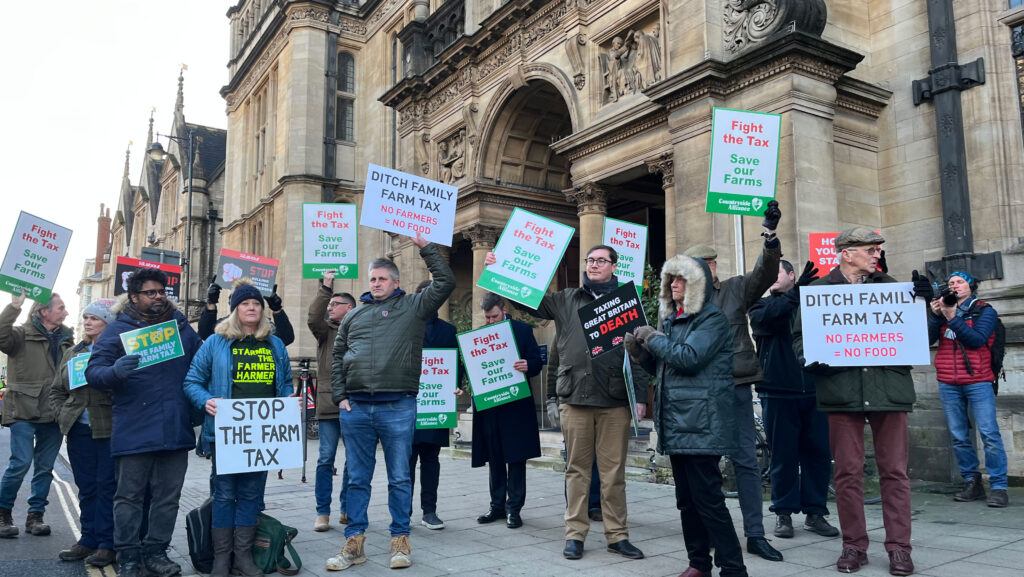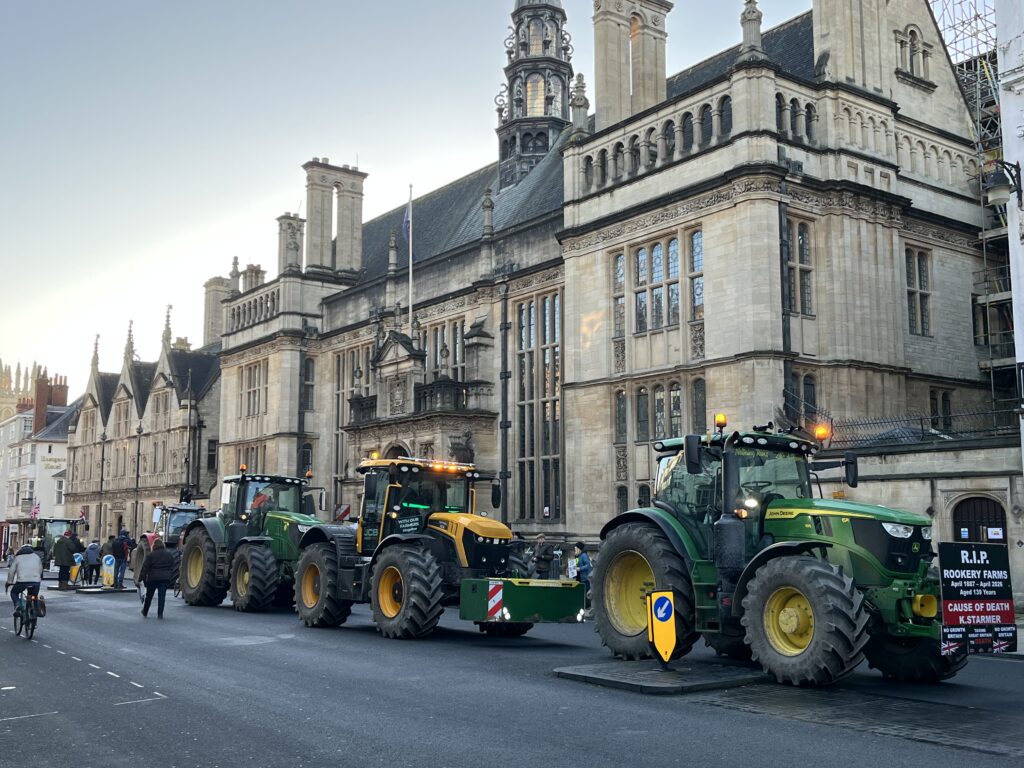Family farm tax protests overshadow Reed’s OFC speech
 © MAG/Philip Clarke
© MAG/Philip Clarke Defra secretary Steve Reed faced a stormy reception at the Oxford Farming Conference (OFC) on 9 January, as protesting farmers expressed their deep frustrations over government policies that they say are undermining the agricultural sector.
Outside the venue, the atmosphere was charged with tension, as a row of noisy tractors lined the streets, carrying banners with anti-government slogans.
Meanwhile, inside, Mr Reed’s speech to attendees took place in a notably sombre atmosphere, with the minister outlining his long-term vision for UK farming.
See also: 89,500 farmers to be hit by inheritance tax, says CAAV
The contrast was striking.
Farmers, many from Oxfordshire and Berkshire, had gathered in large numbers to voice their anger, with tractors blaring horns and displaying banners that read, “Honk if you want Starmer gone” and “Labour. We need you to stop killing British businesses”.
The protesters were clearly determined to make their voices heard, underlining growing discontent over the government’s handling of farming and rural issues.
The focus of their anger was the government’s controversial farm inheritance tax (IHT) policy, set to be introduced in April 2026.
Despite their hopes for action, Mr Reed offered no updates on this issue during his 20-minute speech, further stoking frustration among the farming community.
The minister once again blamed the £22bn “black hole” in the public finances left by the previous Conservative government for his own government’s decision to make difficult budgetary decisions.
“It meant we had to take immediate tough decisions across the economy to balance the books, including on APR [agricultural property relief],” he said.
“We were shocked by the size of the black hole we were left to fill. I’m sorry if some of the action we took shocked you in return.
“But stable finances are the foundation of the economic growth needed to get the economy growing again after it flatlined through a decade of chaos.”
‘New deal’ for farming
Mr Reed attempted to reassure attendees with promises of a government-backed “new deal” for farming.
His speech was delivered with calm and assurance as he spoke of boosting the profitability and sustainability of the agricultural sector.
He highlighted plans to use the government’s purchasing power to back British food producers and accelerate planning reforms to make it easier for farmers to build necessary infrastructure.
He also promised to address fair competition within supply chains, with new rules set to be introduced for sectors such as pork and eggs.
There was also some applause from the floor when Mr Reed confirmed that secondary legislation for the Precision Breeding Bill will be introduced to parliament by the end of March, paving the way for farmers to cultivate gene-edited crops that offer improved nutrition, enhanced resistance to pests and diseases, and greater environmental benefits.
However, despite Mr Reed’s reassurances, the speech seemed to fall on deaf ears for many farmers who felt that the government’s pledges were insufficient to address the mounting challenges facing the sector.
Oxfordshire farmer and former OFC chairman Tom Allen-Stevens, who attended the conference, expressed concern that the government was not listening to farmers’ needs and warned that policies like the inheritance tax could devastate small farming businesses.
He said: “Steve Reed’s biggest mistake is that he has not been listening to farmers.
“He is not doing enough to put farmers’ case to chancellor Rachel Reeves. We are not a wealth pot to plunder.”
NFU boss vows to fight on
Speaking during a press conference later, NFU president Tom Bradshaw, who posed for photos with farmer protesters outside the venue, vowed that the NFU would keep up its fight to stop the “family farm tax”.
He told reporters: “I think they [the government] hoped the discussion around inheritance tax changes, APR [agricultural property relief] and BPR [business property relief] would go away.
“We simply cannot believe that the chancellor has not sat down with us and talked about this policy.
“The human impact of this policy on the elderly generation that have given a lifetime to producing this country’s food doesn’t change – and yet they seem to think we are going to go quiet on this.
“You can hear outside the farmers that have come to protest today and to make sure that their voices are heard and that’s going to continue until the government recognises that they have got this wrong.
“I genuinely believe that they know they’ve got this wrong, but whether there’s a political way out of this or not is the real challenge.”
Mr Bradshaw said the NFU and other farming organisations had written to the chancellor on Wednesday 8 January asking her government to broaden the technical consultation on IHT around the changes to trusts.
“We would like to see that broadened in scope so that they consult on the changes to APR and BPR and really recognise the impact that that’s going to have,” he explained.
But amid reports that some farmers are planning to stage militant action to protest against the IHT changes, Mr Bradshaw warned that it was essential to keep the public on side.
“The public support so far has been incredible and that is something that has given our farmer-members a lot of confidence, and if we lose the public support, the government have won.”

© MAG/Philip Clarke
Reed responds
Speaking to Farmers Weekly, Mr Reed said: “I understand the difficulty and the anguish that a change that is made after quite a long time when inheritance tax hasn’t had to be paid.
“But we are introducing it in a way that is designed to help people.
“For more people who inherit a farming estate, [they] will have £3m exempt from tax entirely.
“For the rest, they will only have to pay half [20%] of what anyone else inheriting an asset of similar value would have to pay.
“And instead of having to pay it all at once, like anyone else would have to, it can be phased over 10 years, so helping support farms become profitable for the future is what I’m going to focus on.”
